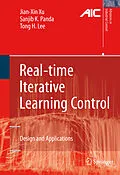Iterative learning control (ILC) has been a major control design methodology for twenty years; numerous algorithms have been developed to solve real-time control problems, from MEMS to batch reactors, characterised by repetitive control operations.
Real-time Iterative Learning Control demonstrates how the latest advances in ILC can be applied to a number of plants widely encountered in practice. The authors provide a hitherto lacking systematic introduction to real-time ILC design and source of illustrative case studies for ILC problem solving; the fundamental concepts, schematics, configurations and generic guidelines for ILC design and implementation are enhanced by a well-selected group of representative, simple and easy-to-learn example applications. Key issues in ILC design and implementation in the linear and nonlinear plants that pervade mechatronics and batch processes are addressed. In particular, the book discusses:
. ILC design in the continuous- and discrete-time domains;
. design in the frequency and time domains;
. design with problem-specific performance objectives including robustness and optimality;
. design by means of classical tools based on Bode plots and state space; and
. iterative-learning-based parametric identification.
Real-time Iterative Learning Control will interest control engineers looking for examples of how this important control technique can be applied to a variety of real-life problems. With its systematic formulation and analysis of different system properties and performance and its exposition of open problems, academics and graduate students working in control will find it a useful reference to the current status of ILC.
Zusammenfassung
Real-time Iterative Learning Control demonstrates how the latest advances in iterative learning control (ILC) can be applied to a number of plants widely encountered in practice. The book gives a systematic introduction to real-time ILC design and source of illustrative case studies for ILC problem solving; the fundamental concepts, schematics, configurations and generic guidelines for ILC design and implementation are enhanced by a well-selected group of representative, simple and easy-to-learn example applications. Key issues in ILC design and implementation in linear and nonlinear plants pervading mechatronics and batch processes are addressed, in particular: ILC design in the continuous- and discrete-time domains; design in the frequency and time domains; design with problem-specific performance objectives including robustness and optimality; design in a modular approach by integration with other control techniques; and design by means of classical tools based on Bode plots and state space.
Inhalt
to ILC: Concepts, Schematics, and Implementation.- Robust Optimal ILC Design for Precision Servo: Application to an XY Table.- ILC for Precision Servo with Input Non-linearities: Application to a Piezo Actuator.- ILC for Process Temperature Control: Application to a Water-heating Plant.- ILC with Robust Smith Compensator: Application to a Furnace Reactor.- Plug-in ILC Design for Electrical Drives: Application to a PM Synchronous Motor.- ILC for Electrical Drives: Application to a Switched Reluctance Motor.- Optimal Tuning of PID Controllers Using Iterative Learning Approach.- Calibration of Micro-robot Inverse Kinematics Using Iterative Learning Approach.- Conclusion.
